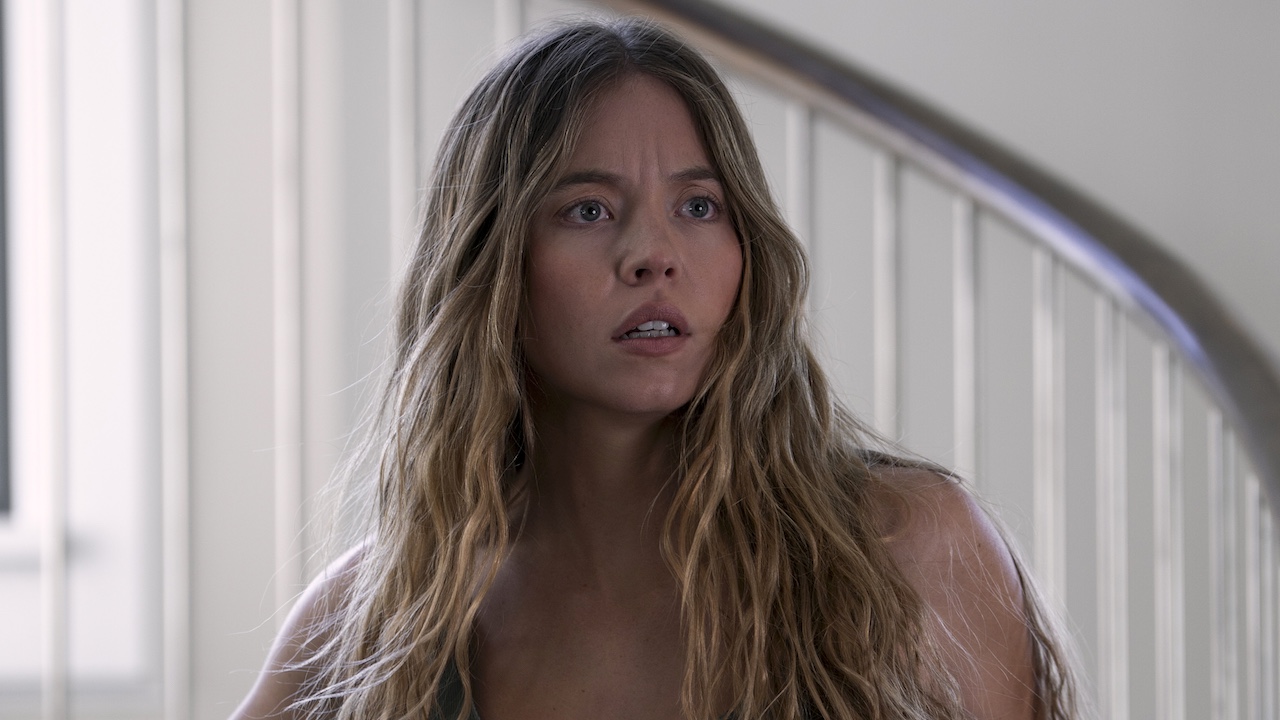Immortals Director Tarsem Singh Talks About The Ill-Fated Horses In His Films
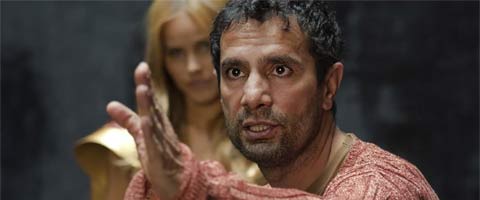
Your Daily Blend of Entertainment News
You are now subscribed
Your newsletter sign-up was successful
Tarsem Singh has only made three movies in his career, debuting his first, The Cell, in 2000, but watching his films you begin to notice a pattern: horses don’t have the greatest amount of luck. From the dissection scene in the Jennifer Lopez thriller, to the titular accident in The Fall, species of the Equus genus aren’t treated like pretty ponies in Singh’s world. So when a pair of horses in Immortals once again experience tragedy, I felt inclined to ask the director about it.
Sitting down with Tarsem Singh one-on-one, I not only asked about what I am dubbing his “horse thing,” but also his approach to each day of filming, the concept of faith, and the use of 3D. Check it out!
So, just to jump in kind of two feet first; one thing that really struck me during the movie- there's two moments, one with Stavros and one with Hyperion, where the characters talk about the gods not answering their prayers and essentially losing faith. And I'm curious-
It's the reason I made the movie.
Yes, well basically I'm wondering is that a character thing or is it a comment about faith?
For me it was actually the reason I started the movie was because of that whole thing. I had no interest in a Greek film or anything. Just super-beings- they could be Batman and Superman interfering with us or if there was gods. And the idea was just, well everybody's old question is just why don't they show up at the White House lawn and say, “Hey! Here we are!” Like “I'm Moses, this is so and so, and be good to each other.” And you just stop at the idea of why does faith have to work on non-definite proof?
And it all started because I was just at dinner with my mom. She says that I've always been blasphemous, since I was a child, since I was nine. [Laughs] But she turned around about three years ago and said this statement to me that I just thought, “That's a movie”. And she said, “How do you think you are as successful as you are?” I said, “It wasn't for my praying.” And I thought, now that's the movie. A real atheist dies and goes up there and the bearded guy goes, “You bastard. I wanted to give you nothing, you deserve nothing, but because of this woman, I made you successful.” So I thought that's the movie, you take a non-believer who becomes the most ardent believer there is later, which tends to happen from born-agains or alcoholics, the recovering ones, always the hardcore ones. So I said, “How do you make a movie about that?” Then I just said, “But why don't they interfere?” That was the reasoning that I took up with. And the reason was that faith, to keep the nature of things, can only work on faith. If you go into direct interference, you influence that particular problem, from right, from Heisenberg's principle, to the ending scene of 2001.
Your Daily Blend of Entertainment News
You know, if you have a zoo you don't want the other creatures to see you. You want them to hang out and act properly and, you know, when the monkeys will come and ask for the bananas, they won't act like monkeys. If you want them to act on what their true nature is, you've got to leave them alone. So the gods thing is, it doesn't matter if they wipe each other out. Their true nature needs to stay on their own. We can guide them acting like them, so they don't recognize us as gods. If they do recognize us as definite proof, y'know you won't be able to do the nasty things you do in the toilet. [Laughs] So that's how I thought through the reasoning. So that movie came from that.
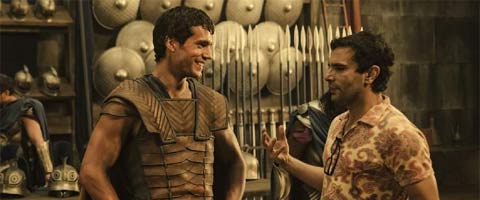
Do you kind of see yourself as Theseus in that sense?
No, not at all! Because he ends up actually believing in the end [laughs].My thing in the end- he actually becomes... unfortunately, he doesn't have any faith at all. Faith is just by definition belief without proof.
Once he gets proofs, it tips, the balance is turned. He doesn't have any faith. He's just got definite proof. Now he knows what it's like- you know the guys who really have that strong a faith and think they can just blow themselves up while walking into some place- if you actually believe that when you do that, a gate is going to open and you're going to go up there and have however many virgins you want, basically it's a different thing all together. But if you're kind of unsure, that's dangerous. Better know! [laughs].So Theseus actually sees the gods. So when he sees the gods, he's just got definite proof. So he's not, like, a character of faith at all. He is the way I think everybody should be, a non-believer.
Sure. And you mention that that was your vision for the film. Was that the idea when you first got the script?
That was the only idea I told him I want to put in. And I said, put it in, and if that works then let's just do it. Because I was thinking, “Do we need gods?” The Theseus story does not involve any gods. And I said, “No, you need gods because I want to make a statement about the gods and I want to do an action sequence with gods fighting that I think will tip the balance in a different way.” So we started to put those in, and I started thinking, does it have to be Greek? I was going to make it all post-apocalyptic, kind of like a Renaissance time but with electricity, I wanted to go to Mexico, things like that. And they said, “No, no, no, the appetite is for Greek movies, they're really big.” And I said, “Well it's not really a Greek movie.” I'm like, “Theseus with gods is like caveman with dinosaurs, the difference is like, a hundred million years.” And they just said, “No, no, it'll come out fine. Just leave it.” So we went close to Greek, but no period stuff is true of anything.
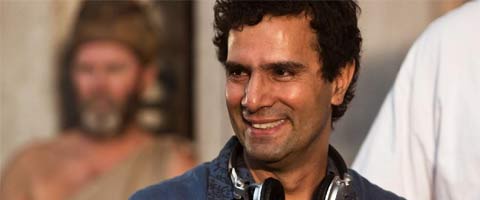
One thing that kind of struck me about your career- I notice a pattern with horses.
Everyone blames me for that! [Laughs] Ok.
Well what's the story there?
I'll tell you what, I remember when I used to do music videos, Tarkvosky used to use milk and I used to use milk only because milk falling on dark grounds looks pretty fantastic. And everybody was saying, “So what's it with this milk?” And I just said, you know what, imagine a liquid falling on dark ground that looks really good and big. And everybody would come up with all these answers of blood if it's white and blah blah blah, and I said, “No. Unless you're talking about a bowl of sperm, it's got to be milk.” [Laughs] So I just turn and take it because it's beautiful. So even our videos started like that. Horses happen to be a really big physical body, that, when if falls or if it moves, people are used to its size and they feel a certain weight for it. It's sort of like a thing where you say, “I want a really, really big creature that doesn't exist,” and then you fight it and you don't feel its weight. But a horse- everybody that you know knows its size, knows its weight, knows it’s all muscle, and when you do something to it you feel physical with it. You ride on it, everything else is physical. So when it falls down or is hurt or something happens to it, it's a very physical reaction.
So in the first one, I didn't even think about that. The first one, all I was thinking of was I wanted to do something shocking, like dissecting something that would freak out writer, who happened to be a horse-lover. [Laughs] And he said, “Anything is ok to not do the horse cutting scene.” And of course, I put it in.
Of course.
So that was there. Then The Fall, that was like, thirty years before that I'd come up with that idea. Like some big accident has happened, and all you see is a suspended horseman. That's all you see in it, and no other thing happens in it. And in this particular one I wanted no horses throughout the movie, because it's kind of when your all on set, horses are like cars. Every time you put one in a movie, your set, like, is five times the size you've got to make it.
So there's only one scene where there's horses. So they arrive in the other place, and I was just like, “We've got to get rid of horses.” Because if these people are to ride from one place to another, it's a different kind of CGI film. And we didn't have the budget for it. So I said, “The goal is going to be to give them horses at one time.” And someone said, “What happens to the horses?” So I said, “Oh, let's kill 'em.” [Laughs] And they just die because they're out of breath, and Athena said they'll run until they're hearts give out. The moment I was putting it in, somebody said, “You know they're gonna blame you for thing again”. [Laughs] I said, “Ok, think of another creature next time.” I don't know.
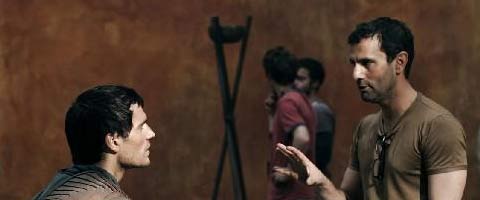
Ok. Do you have horses in Snow White?
They have horses in Snow White? [Laughs] I am lucky nothing nasty happens to horses in Snow White.
Ok, well there you go. And also, just to talk about your visual style a bit- it really is- well with your career so far you've definitely left your mark. And I'm curious what your preparation process is, both pre-production and during production.
It has tended to be much more visual because I wanted to kind of put my DNA out there in the world when I started. So for me it was very much oriented into having kind of unfinished short films, unfinished clips that I could force the visuals into. So of course it was the curse of what everybody says script writing should be, which is like, “Don't put the visuals in front of it.” And I was like, “Aw, lose that story, just put the visual in there.” [Laughs] So I would just do it like that, but not something that I tend to continue on… Because usually I like reading that in literature or reading. I don't particularly like to make a film of it, but now when I'll stop making non-visual films that are all fantastical, I'd like it to be script-oriented. Then I'll push for these scripts that reflect what I want to do.
Absolutely. Do you plan out every single day? Do you bring to set exactly what you want to have?
Um, close to it. Location wise, it's completely different when I do locations for The Fall- I don't know if you've seen it…
Yes, I have.
That's all location. And there I just have to go to the location, find 'em and then figure out what I need to do. This particular one- something that comes naturally to me is how things need to be lit. Usually I design the lighting and when I have the physical set there, I'm not good at going out loosely and saying, “Do you what you want, give it to the editor, and he'll figure it out.” I physically then walk on with the actors and I say, “Let's walk until you guys feel the space works for you, and tell me when all that happens.” And once you figure that out, it's just now, “Shoot wide shot with that, it’s a rehearsal. We can do 50 of these takes if you want, until you see the scene starts to work, then I'll come in and tell you what you're filming.
Just let them play on, literally like a play. Unless it's action. Then I usually say, “Ok, what kind of action is it?” Is it the fantastical, is it bite the ear, rip off the tongue kind of stuff? Or is it more visceral? Or is it psychological? Then I just plant those ones in different places, and then I just say something really nasty has to happen here, this guy is a bad guy, what'd he do? “Well, he sold out the last teeth of the guy who will cut out his own tongue.” I throw that in, and that kind of stuff I just play around.
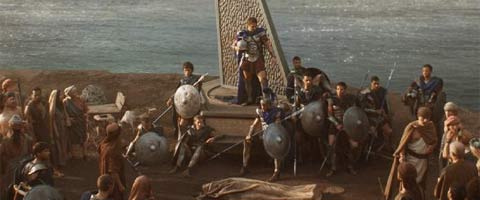
Sure. And when did 3D enter the conversation?
Oh no, no, no, long before I started I said, “There is no way they can turn this into 3D later.” I just said it has to be when I plan it, because it will slow me down immensely. I will take calculations for everything and I will shoot with that in mind. They asked me to hurry up, and I said there's no way I will do it in 3D if you need to finish it. Because it's ready, I will beat them in no time. But for 3D I need a complete year. You saw it in 3D I take it?
Yes.
Well, I think in 3D most people are interested in pulling things out of the screen. And I was just saying, I would like it to have a depth back into the screen. Just give it that dimension. And that's enough. It's not like a drop-your-popcorn kind of movie.
Is Snow White going to be post-converted? Or no?
No, no, no, because when they told me I said unless you have a year there’s no way. You just have the bar set so incredibly low by Clash [of The Titans] that everybody saw the numbers that those cursed, so you just got to walk away from it.

Eric Eisenberg is the Assistant Managing Editor at CinemaBlend. After graduating Boston University and earning a bachelor’s degree in journalism, he took a part-time job as a staff writer for CinemaBlend, and after six months was offered the opportunity to move to Los Angeles and take on a newly created West Coast Editor position. Over a decade later, he's continuing to advance his interests and expertise. In addition to conducting filmmaker interviews and contributing to the news and feature content of the site, Eric also oversees the Movie Reviews section, writes the the weekend box office report (published Sundays), and is the site's resident Stephen King expert. He has two King-related columns.
